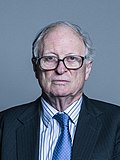Top Qs
Timeline
Chat
Perspective
Shadow Cabinet Minister for International Development
Shadow Cabinet office From Wikipedia, the free encyclopedia
Remove ads
The shadow cabinet minister for international development is the lead spokesperson for the United Kingdom's Official Opposition on issues related to international aid, most notably to the Third World. The shadow cabinet minister holds the minister of state for development and Africa to account in Parliament. The role previously had no counterpart in the Government between 2020 and 2022 after the Department for International Development (DFID) and the role of international development secretary was abolished by the second Johnson government in 2020. The position was renamed from shadow secretary of state for international development in November 2021 and placed under the shadow foreign secretary.
The shadow minister also holds the foreign secretary and other FCDO ministers to account in Parliament. DFID was abolished in 2020 but Keir Starmer retained the role in his Shadow Cabinet.
Before Tony Blair established DfID in his first government after coming to power in 1997, there was a minister for overseas development ("minister of" before 1970) who was a part of the Foreign and Commonwealth Office. Since 1989, the shadow minister or shadow secretary has usually been a member of the shadow cabinet.
Remove ads
Shadow ministers and secretaries
Remove ads
Notes
- Richard Wood replied for the Opposition in a debate on 24 February, six days after Margaret Thatcher named her Shadow Cabinet. Various other Conservatives, including the Reginald Maudling (as Shadow Foreign Secretary), Peter Tapsell, and John Davies (as Shadow Foreign Secretary) replied in debates on overseas development thereafter.
- John Major's interim Shadow Cabinet consisted of those members of his Cabinet who retained their seats at the 1997 general election, but there had been no International Development Secretary, and the Overseas Development Minister was not in Cabinet. According to the Shadow Cabinet list, Major himself was responsible for Foreign Affairs (the department responsible for development in his government), but ministers could "call on the services of Members who served under them in Government".[6] It is unknown whether Major called on the service of Baroness Chalker of Wallasey, the last Minister for Overseas Development, during the approximately two months before William Hague was elected leader. Therefore it is unclear whether the office was vacant or non-existent, or whether Major or Chalker should be considered to have held it.
- Under Labour Party rules, ministers shadow their former roles when the party enters opposition.[14] Alexander was International Development Secretary when Gordon Brown resigned as Prime Minister.[15]
Remove ads
References
Wikiwand - on
Seamless Wikipedia browsing. On steroids.
Remove ads



























